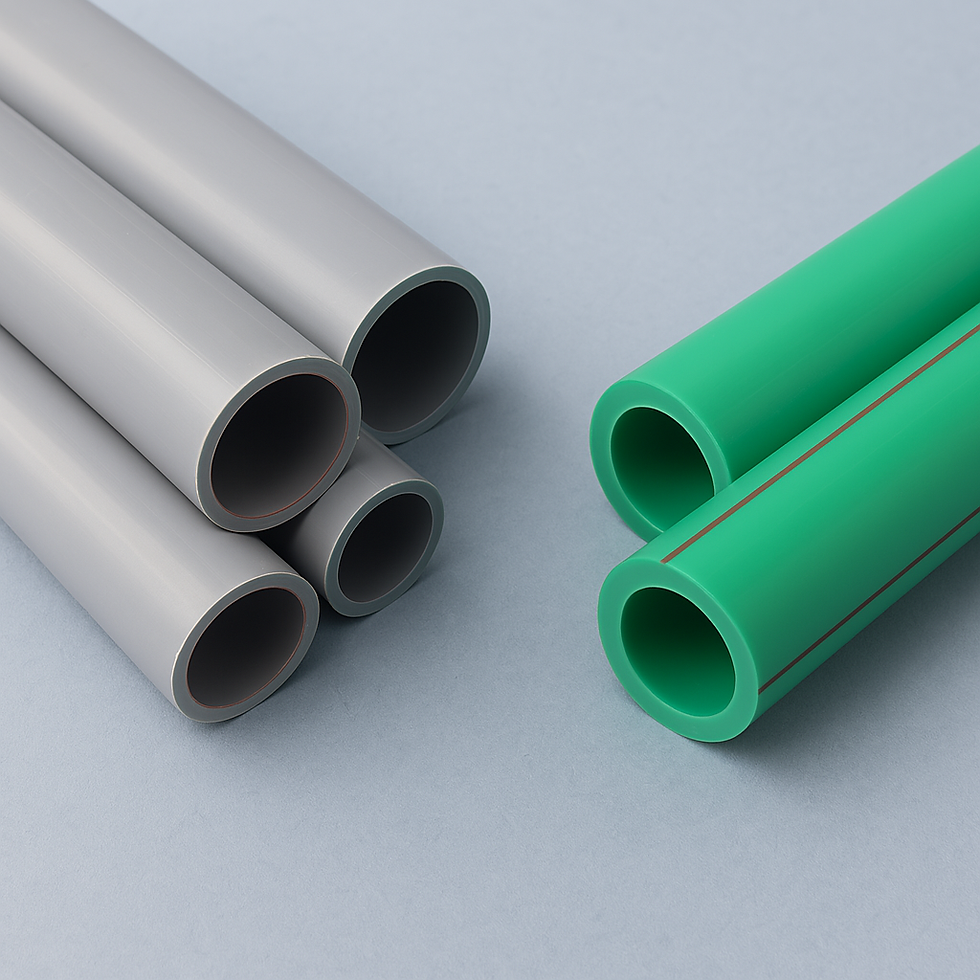How HDPE Pipes Improve Agricultural Water Management
- Adamjee DuraBuilt
- Mar 14, 2025
- 4 min read

Introduction
Water is the lifeblood of agriculture, yet managing it efficiently remains one of the biggest challenges for farmers. With rising global water shortages and increasing demands for food production, optimizing irrigation systems has become a priority. One of the most effective solutions available today is the use of HDPE pipes in agricultural water management.
HDPE (High-Density Polyethylene) pipes are revolutionizing modern irrigation by providing a durable, leak-proof, and cost-effective water transportation system. These pipes ensure that every drop of water reaches the crops with minimal loss and maximum efficiency. In this blog, we’ll explore how HDPE pipes and fittings help in agricultural water management and why they are becoming the preferred choice for farmers worldwide.
Challenges in Agricultural Water Management
Efficient water management is crucial for sustainable agriculture, yet several challenges hinder its implementation:
1. Water Scarcity
Agriculture accounts for 70% of global freshwater consumption (FAO). However, many regions suffer from water shortages due to climate change and excessive consumption.
Farmers must adopt efficient irrigation systems to conserve water resources.
2. Inefficient Irrigation Systems
Traditional irrigation methods such as open canals and flood irrigation lead to excessive water wastage through evaporation and seepage.
Old piping systems often suffer from leaks, rust, and blockages, reducing overall efficiency.
3. Soil and Water Contamination
Corrosion-prone pipes introduce contaminants into water supplies, affecting soil health and crop quality.
Leaking pipes can cause waterlogging, leading to poor plant growth and soil degradation.
4. High Maintenance Costs
Conventional materials like metal and concrete require frequent repairs and replacements, increasing costs for farmers.
High labor costs associated with repairing damaged pipelines.
Why HDPE Pipes and Fittings Are the Best Choices for Agricultural Water Management
HDPE pipes address the challenges mentioned above by offering superior properties, making them ideal for agricultural use:
1. Durability and Longevity
Resistant to corrosion, rust, and UV radiation, ensuring long-term reliability.
The lifespan of 50+ years, reducing frequent replacement costs.
2. Flexibility and Impact Resistance
Unlike rigid materials, HDPE pipes are highly flexible, allowing them to withstand ground movements, expansion, and contraction without breaking.
They can be bent or curved easily, making them ideal for uneven terrains.
3. Leak-Proof and Water-Efficient
HDPE pipes use heat-fused joints, ensuring a 100% leak-proof system.
Prevents water loss, ensuring maximum delivery to crops.
4. Chemical and Corrosion Resistance
Resistant to fertilizers, pesticides, and other chemicals commonly used in agriculture.
No risk of rusting or degradation over time.
5. Cost-Effectiveness
Lower installation and maintenance costs compared to PVC, metal, or concrete pipes.
Lightweight design makes transportation and handling easier, reducing labor costs.
Applications of HDPE Pipes in Agricultural Water Management
HDPE pipes serve multiple functions in agriculture, improving water delivery and conservation.
1. Irrigation Systems
Efficient irrigation ensures optimal water usage without excessive wastage:
Drip Irrigation: Delivers water directly to plant roots, reducing evaporation and runoff.
Sprinkler Irrigation: Ensures uniform water distribution with minimal water loss.
Surface Irrigation: Helps control the flow and distribution of water over large areas.
2. Water Transport and Storage
Used for connecting reservoirs, tanks, and borewells to irrigation systems.
Prevents contamination, ensuring clean and safe water for crops.
3. Drainage and Water Recycling
Agricultural Drainage Systems: Prevents waterlogging and soil erosion.
Water Reuse: Facilitates recycling of irrigation water for sustainable farming.
Advantages of Using HDPE Pipes in Agriculture
Adopting HDPE pipes for agricultural water management provides multiple benefits:
✔ Lightweight & Easy Installation: Requires fewer labor resources and speeds up setup time.✔ UV-Resistant: Maintains durability even in direct sunlight.✔ Eco-Friendly & Recyclable: Reduces environmental impact compared to PVC and metal pipes.✔ Energy-Efficient: Lower friction allows water to flow smoothly, reducing pump energy consumption.✔ Compatible with Modern Irrigation Technology: Works seamlessly with automated irrigation systems.
HDPE Pipes vs. Other Agricultural Piping Materials
HDPE pipes outperform traditional materials in several ways:
HDPE vs. PVC Pipes
Stronger & More Flexible: HDPE is more impact-resistant than PVC.
Better Chemical Resistance: HDPE does not degrade when exposed to agricultural chemicals.
Longer Lifespan: HDPE lasts 50+ years, while PVC has a shorter service life.
HDPE vs. Metal Pipes
Corrosion-Free: Metal pipes rust over time, contaminating water.
Lighter Weight: HDPE is easier to transport and install.
Lower Maintenance Costs: No need for frequent repairs or replacements.
HDPE vs. Concrete Pipes
Flexible & Crack-Resistant: Concrete pipes are prone to cracking under pressure.
Lower Installation Costs: Requires less labor and heavy machinery.
Leak-Proof Joints: Concrete pipes have joint gaps that cause water leakage.
Real-World Applications: Success Stories of HDPE Pipes in Agriculture
Many agricultural projects have successfully implemented HDPE pipes to improve water efficiency:
India: Farmers in drought-prone regions switched to HDPE-based drip irrigation, reducing water wastage by 50%.
Australia: Large-scale farms integrated HDPE pipes with rainwater harvesting systems, ensuring year-round irrigation.
HDPE Pipes in Pakistan: Farmers adopted HDPE pipes for flood irrigation, reducing soil erosion and water loss.
Conclusion
Efficient agricultural water management is essential for sustainable farming, and HDPE pipes offer the perfect solution. With superior durability, flexibility, leak-proof performance, and cost-effectiveness, they are rapidly becoming the preferred choice for irrigation systems worldwide.
By investing in HDPE pipes and fittings, farmers can reduce water wastage, cut costs, and improve crop yields, ensuring a greener and more productive future. It’s time for the agricultural sector to embrace modern, sustainable solutions for water conservation.
Are you ready to revolutionize your farm’s irrigation system? Choose HDPE pipes today!












Comments